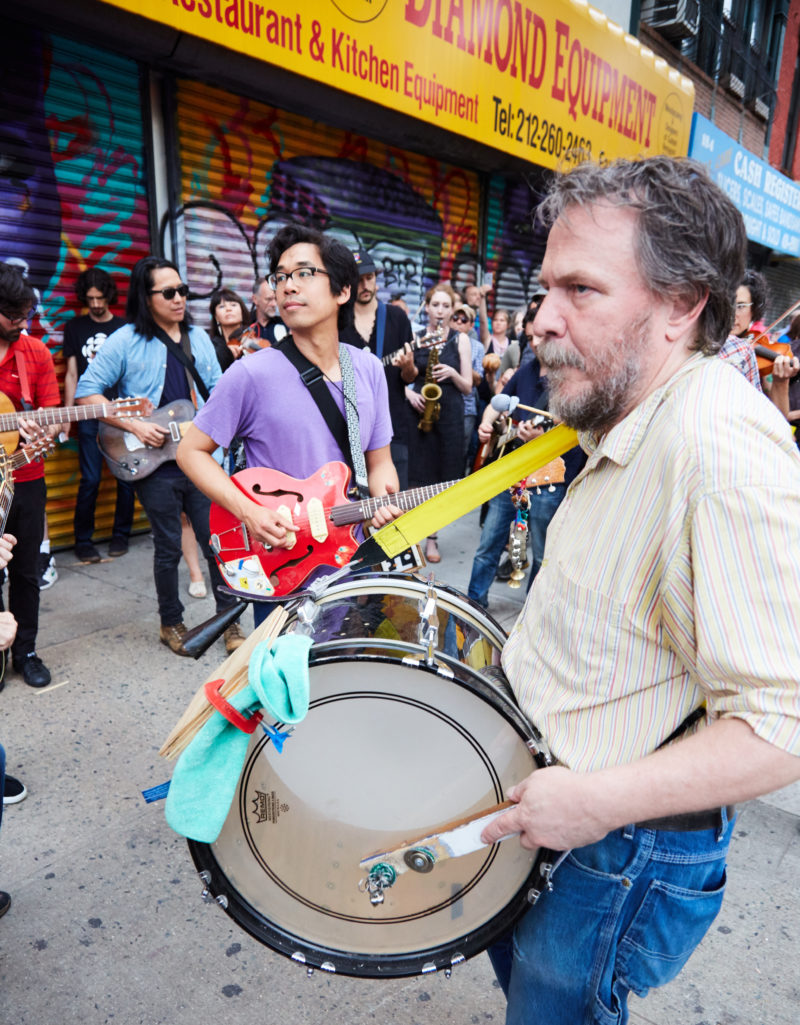75 DOLLAR BILL

Soup
“75 Dollar Bill is a soup”, Che starts when asked about their musical influences and blending of styles. “Rick and I are both enthusiastic listeners to sounds from all over, so that “all” makes its way into the music somehow. Personally speaking, my parents immigrated to the US from Taiwan, so growing up sort of in between two cultures I've never felt that any particular kind of music was mine, in the way that kids around me seemed able to claim rock music or punk or hip hop or whatever. I think it's that feeling that led me to listen to things from everywhere and to start to draw connections between them, and maybe this band is a way for me to try to make a music that speaks to my experience.”
Rick’s background is a little different but it certainly helped him overcome musical boundaries. “Because my father was in the military, I moved frequently as a kid, which is something I think had a role in making me open to and curious about places, people and languages. But, while I pick up little fragments and notions from listening to various music, I don’t think blending is the best description of our process. For me, music usually involves a stripping down to elements and simple relationships and patterns and then building a piece of music with what is available.”
Hybrid musics
In modern times, traveling is relatively cheap and with an internet connection a lot of music becomes instantly available. Che has no illusions when it comes to the purity of unspoiled, isolated musical cultures. “Notions of purity are really a fiction. They are fantasies about otherness or idealized historical moments. All musics are hybrid musics. It’s true that some musical forms manage to remain remarkably stable for a time, but even within that, there are changes, outside influences and revivals if you look more closely. I think an increased awareness that there are other people alive on this Earth, living their lives far away and under very different circumstances, but nonetheless with some basic similarities to yours... well this cannot be a bad thing. Musical hybrids may arise at a much faster rate now because of technology but I think the deeper knowledge still passes on in the same ways as it always has, slowly, from person to person.”

Rock and Roll
The repetitive guitar play and rhythms of 75 Dollar Bill’s music should certainly appeal to the crowd who are looking for a trance-like state of mind. “I’m sometimes mesmerized by the music we make and I hope/assume some in the audience hear it that way, too”, Rick responds. However, the true rock and roll spirit and its rebellious character is never far away. “I’m very much coming from the background of a rock music fan born in 1957. While my father was a jazz drummer, I didn’t hear much jazz myself until after I developed an interest in rock and eventually weird rock (Beefheart/Zappa, Eno/Roxy Music and so on). Learning that my favourite musicians were interested in and appreciating Miles Davis, Ornette Coleman, Harry Partch, Charles Ives and more made me want to listen and learn about these jazz and classical outsiders/avant-gardists.”
“I personally don’t completely associate rock and roll with rebellion”, Rick continues. “Granted, its evolution was fuelled by the societal changes in the '50s and '60s, but by the time I was really listening (in the early '70s) it was fairly well established as the dominant music of the time in the US and was losing its association with rebellion (partly because of the rise of rock stars). Punk was rebellious, too, against that rock-star thing and notions of professionalism. But it was the so-called post-punk of the Raincoats, Pere Ubu, This Heat and the working class ears-wide-openness of some of the SST bands, especially Minutemen, that are the strongest rock-influences for me.”
Che calls rock and roll “an inevitable reference point”, the band tipping their hat to it in various ways. “Although I have to say I listen to very little rock music. I feel the most affinity with early rock and roll, someone like Bo Diddley or even earlier forms of electrified blues. I also love the Velvet Underground and have a soft spot for Led Zeppelin but you’re much more likely to find me listening to Ornette Coleman, Alice Coltrane or the Dagar Brothers on any given day.”
I Was Real
75 Dollar Bill has just finished a new album called I Was Real, which will be released on Thin Wrist Records in early 2019. “It includes many tunes that date back to the origins of the band, so it’s exciting to have them documented, along with some newer directions as well”, Che announces. On the question how these songs came together, he declares that endless practice might as well be the most important thing. “We spend a lot of time working on grooves, just practicing rhythms. Often we’ll just work on the rhythmic aspects of a new idea for a while before I even pick up a guitar. Other times the guitar ideas come first. I try to come up with a melodic framework that includes specific lines and fragments that can be recombined, deconstructed or forgotten altogether in performance.”
Rick has a wondrous mathematical approach to composing music: “some of our music uses rhythms based on ideas I have about number sequences and relations between numbers (sometimes related to division or factorization and sometimes addition to create interesting compounds) and sometimes Che will sketch his own ideas or mine out on graph paper to help explore rhythmic counterpoint and layers. These are often attractive visually – the rhythms used in our song I’m Not Trying to Wake Up supplied part of the raw material for Che’s cover design of our last album. We do improvise of course, but for many of our pieces I have a very small number of elements. I think repetition is probably as big a part of our sound as improvisation. I should say, too, that as much as some of those ideas appeal to me, I only stay interested if they lead to some kind of groove.”
A social thing
The new album will feature a number of guests, an important aspect as Che explains. “We like the idea that the band can change shape to fit different situations and ideas. Music is a social thing and we’re happy that we get to share it with so many great people.” Working with other musicians comes naturally for the duo. “I just released Catherine Lamb’s first solo LP shade/gradient on my label, Black Pollen Press. She’s a wonderful violinist, singer and composer based in Berlin. I’m improvising with some different small groups and trying to learn how to play contrabass. Using that grip master!” Che adds enthusiastically.
Rick is in a long-time musical and personal relationship with Sue Garner. “We call our duo Two Mule Team. Beyond that, she and I sometimes play her music with others including Che, Talice Lee and Ted Reichman. Most recently, Two Mule Team have served as a sort of backing band for the great singer/songwriter Willie Klein, who was an important member of the NYC no-wave associated group Mofungo in the 80s.”
Che states the crucial aspect of surroundings and spaces and how they influence their music: “at the moment we are in the middle of a week long residency at a little bar in Brooklyn called Troost. It is a few minutes walk from our rehearsal space in Greenpoint, and for many years I lived just a few blocks away on the same street. Around the time that we started 75 Dollar Bill, I befriended the owner, John Ortiz, and was able to talk him into letting us do these periodic residencies at Troost, which had only been open for a little while at that point. So the beginning of the bar and the band are sort of intertwined.”
“Rick and I were looking for a context to play in that wasn’t the normal 25 minute set on a five band rock or noise bill. The music was repetitive and groovy and long and we thought it would benefit from a less formal, more social environment. We were also interested in the way that week or month long stands used to typify the jazz era, where musicians could really build a relationship to a specific place and audience by playing at the same place regularly for long periods. We are interested in the community aspect of it, where the music has a use, whether it’s for trancing out, dancing, or catching up with an old friend. We play all kinds of situations, but especially look for ones that have some of the spirit of what we have been able to do at Troost.”